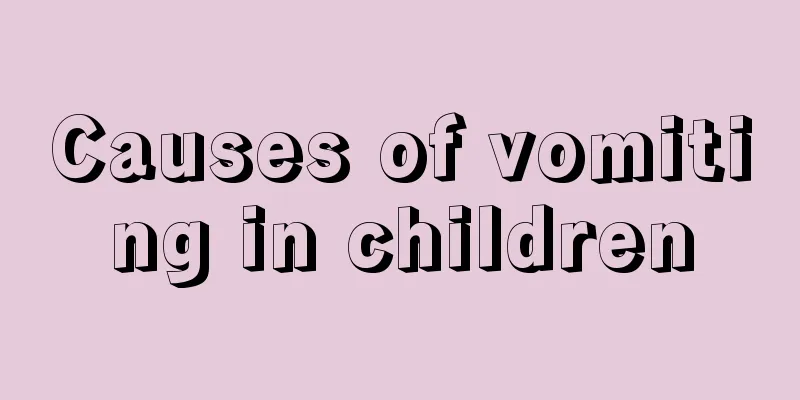What are the symptoms of zinc deficiency in babies?

|
When it comes to children suffering from zinc deficiency, many people have heard about it. During a certain period when the baby's body is developing, the child may suffer from zinc deficiency due to some reasons. At this time, many parents did not think that their baby was zinc deficient at first, or they did not have some specific understanding of zinc deficiency in their baby, so they could not take good care of their child's body. Therefore, many parents still want to know what are the symptoms of zinc deficiency in their baby? 1. Loss of appetite: picky eating, anorexia, refusal to eat, general reduction in food intake, children do not feel hungry, and do not take the initiative to eat; 2. Eat weird things. For example: biting nails, clothing, chewing toys, hard objects, eating hair, paper scraps, raw rice, wall dust, soil, sand, etc.; 3. Slow growth and development, height is 3-6 cm lower than the same age group, and weight is 2-3 kg lighter; 4. Low immunity, frequent colds and fevers, repeated respiratory tract infections such as tonsillitis, bronchitis, pneumonia, sweating, night sweats, etc.; 5. White spots appear on the nails, hangnails grow on the fingers, and geographic tongue appears (irregular red and white patterns on the surface of the tongue); 6. Hyperactivity, slow reaction, lack of concentration, and poor learning ability; 7. Vision problems: decreased vision can easily lead to night vision difficulties, myopia, hyperopia, astigmatism, etc.; 8. Skin damage: When trauma occurs, the wound is not easy to heal; prone to dermatitis and stubborn eczema; 9. Delayed sexual development during puberty, such as: small testicles and penis, low testosterone levels, and low sexual function in males; late breast development and menstruation in females; late appearance of pubic hair in both males and females; 10. Recurrent oral ulcers. 1. Dietary supplements: Infants rely on breast milk to supplement zinc. Infants should be breastfed for at least 3 months. The absorption rate of zinc in breast milk is high, reaching 62%. After weaning, add zinc-rich foods such as beef, mutton, lean pork, peanuts, soybeans, carrots, oysters, etc. According to measurements, the zinc content in animal foods is higher than that in plant foods, and the amino acids produced after the decomposition of animal protein can promote the absorption of zinc, with the absorption rate generally around 50%; while the zinc contained in plant foods can combine with plant acid and cellulose to form water-insoluble compounds, thereby hindering human absorption, with an absorption rate of around 20%. Note: Excessive food processing will destroy zinc. Therefore, you must control the heat when cooking food to reduce the loss of zinc. When the content of iron, calcium, phosphorus, copper and other ingredients in food is too high, the absorption and utilization rate of zinc will be reduced. Food diversity should be ensured in daily diet, and efforts should be made to achieve a balanced diet. How to supplement zinc deficiency in infants 2. Drug supplementation: must be carried out under the guidance of a doctor Since there are many factors that affect zinc absorption, especially for children with anorexia, they often enter a vicious cycle and find it difficult to get the required zinc from food, so they must supplement with medication. Currently, zinc preparations include zinc sulfate, zinc gluconate, licorice zinc, yeast zinc, etc. Note: Be careful that the effective dose of zinc is very close to the toxic dose. Improper use can easily lead to overdose and induce a series of diseases such as iron deficiency, copper deficiency, and anemia. 3. Which foods are rich in zinc: lean beef, pork, lamb, chicken hearts, fish, oysters, egg yolks, skimmed milk powder, wheat germ, sesame, walnuts, oysters beans, peanuts, millet, and radishes. 4 How much zinc does a baby need every day: 3 mg/day for children under 6 months old; 5 mg/day for children 6 to 12 months old; 10 mg/day for children 1 to 13 years old; 15 mg/day for children over 13 years old. Precautions If children have a normal diet and are not sick, their daily zinc intake from the diet can basically meet this standard. Zinc is a trace element, so supplementation must be moderate. If you consume too much, it can cause poisoning, gastrointestinal symptoms such as nausea, vomiting, abdominal pain, diarrhea, etc. It can also cause fever, anemia, growth retardation, joint bleeding, bone decomposition, kidney failure, cardiovascular and cerebrovascular diseases, etc. Excessive intake of zinc in the human body will interfere with the absorption of other nutrients. Too much zinc in the body will also inhibit the phagocytic and bactericidal effects of white blood cells, causing impaired immune function. During the baby's growth process, parents need to provide nutritional supplements in all aspects, especially some elements in the body. The above article introduces the symptoms of zinc deficiency in babies, so that you can better and more timely remedy the situation based on the findings and avoid problems that may affect your child's growth. |
<<: What vegetables are nutritious for children?
>>: What are the symptoms of zinc deficiency in children?
Recommend
Why does my baby always stick out his tongue?
When babies are very young, they can only stick o...
How many times a day does a baby who is not yet one month old poop?
There is a lot to know about babies. Can the numb...
Why are the skin on children's fingers peeling?
Children are the weakest because of their low res...
How to reduce fever in a three-year-old baby
How to reduce fever in a three-year-old baby? Whe...
How to deal with redness in the corners of your child's eyes
There are generally two situations when the corne...
What should I do if my child’s tonsils are red and swollen?
When children have a cold and cough, their tonsil...
What should I do if my baby has a hole in his big tooth?
Most babies usually like to eat sweets very much....
What should I do if my baby has BCG abscesses?
Some babies need to be injected with BCG vaccine ...
What should I do if my 3-year-old baby coughs?
Coughing is not a disease, but once it starts, it...
Early symptoms of cerebral palsy in children
The phenomenon of cerebral palsy in children is v...
What can children with precocious puberty eat?
Nowadays, most children with precocious puberty a...
Treatment for white spots on baby nails
In fact, it is very difficult to take care of bab...
What should I do if my child has a muscle strain?
Many children do not exercise regularly, and they...
What should I do if my baby has a cut on his chin?
Babies are young, naturally active, and without a...
How to improve the fetal monitoring problem
Fetal monitoring can check whether the baby's...









